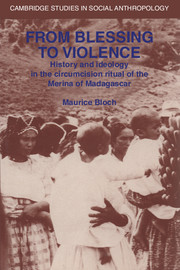Book contents
- Frontmatter
- Contents
- Preface
- 1 The social determination of ritual
- 2 Background politico-religious history of the Merina, 1770–1970
- 3 Background to Merina social organisation and religion
- 4 Description and preliminary analysis of a circumcision ritual
- 5 The symbolism of circumcision
- 6 The myth of the origin of circumcision
- 7 The history of the circumcision
- 8 The circumcision ritual in history: towards a theory of the transformation of ideology
- Notes
- References
- Index
- CAMBRIDGE STUDIES IN SOCIAL ANTHROPOLOGY
- Frontmatter
- Contents
- Preface
- 1 The social determination of ritual
- 2 Background politico-religious history of the Merina, 1770–1970
- 3 Background to Merina social organisation and religion
- 4 Description and preliminary analysis of a circumcision ritual
- 5 The symbolism of circumcision
- 6 The myth of the origin of circumcision
- 7 The history of the circumcision
- 8 The circumcision ritual in history: towards a theory of the transformation of ideology
- Notes
- References
- Index
- CAMBRIDGE STUDIES IN SOCIAL ANTHROPOLOGY
Summary
This book has been almost fifteen years in the making because, when I started to produce a study that combined anthropological research and primary historical research, I did not realise the sheer practical difficulties of the enterprise. It is an attempt to combine knowledge of the intimate interconnections of all the aspects of life and the subjective empathy, which are the main values of participant observation, with the historical perspective, which is necessary to face up genuinely to the sociological questions and wider theoretical issues the material presents.
Perhaps it was the historical side that was most time-consuming for someone little used to dealing with archives. It was because of the help of several professionals that I got anywhere at all. I feel greatly indebted to the following historians, who have drawn my attention to potential sources and have commented on my use of this material: S. Ayache, G. Berg, S. Ellis, M. Esoavelomandroso, F. Raison-Jourde.
The anthropological field-work also required help of another kind. First of all it was only possible because of the willingness and even encouragement of the peoples whose lives I was able to share in the villages of Madagascar where the research was carried out. I learned a lot from them, notably about their customs and society, but also about myself and my society and the issues of life, death and moral commitment, which what they said and did forced me to reconsider.
- Type
- Chapter
- Information
- From Blessing to ViolenceHistory and Ideology in the Circumcision Ritual of the Merina, pp. ix - xPublisher: Cambridge University PressPrint publication year: 1986

